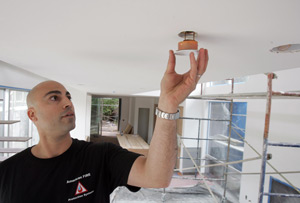
A new state requirement calling for fire sprinklers in all new homes may make them more expensive, but it is raining good fortune on some local companies.
The residential fire sprinkler business at American Fire Protection Systems Inc. is on track to double this year as a result of the fire sprinkler requirement, which went into effect in January.
Simon Farahdel, the company’s chief executive, is projecting that American Fire’s annual revenue will increase from $4 million last year to $5 million.
“Our strongest revenue right now is in the housing market,” Farahdel said. “When the economy improves, obviously we will be a lot busier with more new home construction.”
American Fire, a 10-employee company at Fairfax Avenue and Fifth Street in L.A.’s Fairfax District, installs fire sprinkler systems in residential and commercial buildings, including projects for such prominent L.A. developers as Rick Caruso and Sonny Astani.
The company charges about $2 to $2.50 a square foot for a residential fire sprinkler system in a home. So a sprinkler installation in a 2,000-square-foot house would cost $4,000 to $5,000.
American Fire is just one of several L.A.-area fire sprinkler installers with more business as a result of the new requirement, which includes newly built one- and two-family homes and townhouses statewide.
Business at Fire Protection Group Inc., on Jefferson Boulevard in the West Adams district of Los Angeles, has increased by about 10 percent thanks to the residential fire sprinkler requirement. The company, which also has offices in Oakland and London, outfits residential, commercial and industrial buildings with fire sprinkler and alarm systems. It charges about $1.75 to $2.25 a square foot for residential sprinkler systems.
“We have seen some increase in business,” said George Saadian, general manager and lead engineer at Fire Protection. “We know that construction will increase in single-family homes, therefore we are projecting more jobs will be coming out of that.”
Fired up
The sprinkler requirement comes from the state fire marshal and is enforced locally. Sprinklers were already required in many cities and in areas of high fire danger. The state requirement makes the sprinklers mandatory throughout California – in unincorporated areas and cities that didn’t already have the requirements.
In the year leading up to the requirement, the state Fire Marshal’s Office held meetings with homebuilders, general contractors and fire sprinkler installers.
“It just took a lot of time and a lot of research to get it done,” said Kevin Reinertson, supervising deputy state fire marshal. “But these systems are a proven commodity that save lives.”
The Building Industry Association of Southern California, which covers Los Angeles and Ventura counties, has been working to connect homebuilders with fire sprinkler contractors since last year in anticipation of the requirement.
Holly Schroeder, chief executive at the association’s local chapter, said people in the homebuilding industry are concerned that the sprinkler mandate and other requirements are driving up costs, which could result in an even slower recovery of the housing market.
But the requirement has been good for sprinkler companies like Farahdel’s.
He started American Fire five years ago after working in the fire protection business with his cousins. Farahdel, 36, has since built up American Fire through referrals from general contractors and clients, in addition to advertising online in trade publications such as the Blue Book Building and Construction Network.
Prior to the state’s residential sprinkler requirement, American Fire’s business was about 80 percent commercial work and 20 percent residential. Residential fire sprinkler systems now account for about half of the company’s business, and the increase is on track to boost residential revenue from $1 million last year to $2 million this year, accounting for the company’s entire annual growth of 25 percent.
American Fire works mostly with smaller homebuilders that construct two or three homes at a time, for example, because the profit margin on jobs for larger homebuilders such as KB Home is too low for a small business such as American Fire, according to Farahdel.
For a residential fire sprinkler project, American Fire starts work at the beginning of construction.
The company maps out the location of each sprinkler head, which are concealed by a flat plate so they are aesthetically pleasing, and then receives approval from the plan from building and fire officials in the jurisdiction. It takes American Fire about two weeks to finish a project from beginning to end, although the company has to do a final inspection with local officials after a home is built.
“We like to be in and out of a project as quick as possible,” Farahdel said, “so the other trades can come in and we stay out of their way.”
Calabasas construction contractor Titan & Co. Inc. hired American Fire to install sprinklers at a client’s West Hollywood home that started construction in January. Titan razed an older home and replaced it with a 2,300-square-foot house, which is set to be finished by October.
Matt Armato, president at Titan, said his client worried the sprinkler system could malfunction and damage the property, and was also concerned that the sprinklers wouldn’t look good.
What’s more, the approval process was an adventure. West Hollywood had to approve the building plans, Beverly Hills had to check the water pressure because the house is serviced by that city, and two officials from the Los Angeles County Fire Department had to sign off on the sprinkler plan.
Farahdel is anticipating a continuing increase in the residential business when new home construction recovers. Also, he said, homeowners are starting to install systems in remodeled homes.
“If we are going on at this pace, we will continue to double our business for the year,” Farahdel said. “And that’s just residential.”
